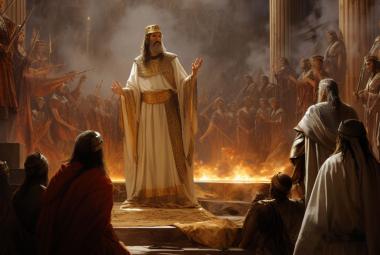One of the most familiar “Christmas Card” verses is found in Isaiah:
For unto us a child is born, unto us a son is given: and the government shall be upon his shoulder: and his name shall be called Wonderful, Counselor, The mighty God, The everlasting Father, The Prince of Peace. Of the increase of his government and peace there shall be no end, upon the Throne of David, and upon his kingdom, to order it, and to establish it with judgment and with justice from henceforth even for ever.
Isaiah 9:6-7
(Incidentally, the initial clauses are not synonymous: “a child is born” is human; “a son is given” is divine. It is interesting that the brightest star in the constellation of Virgo, Al Zimach, Tsemach in Hebrew1—“the Branch”—is a double star!)
The Throne of David is one of the most controversial aspects of the Christmas season, and remains a source of confusion among many Christians.
The Davidic Covenant
God’s covenant regarding David was one of the unconditional covenants.2 Its implications remain as one of the most misunderstood (and challenging) aspects of the Biblical record.
After Solomon died, and a civil war ensued, the nation split into the Northern and Southern Kingdoms. The Northern Kingdom descended into idolatry and God used the Assyrian Empire to ultimately wipe them off the map.
The Southern Kingdom also proved unfaithful, which then led to their captivity for seventy years in Babylon. Despite its tragic decline, the Southern Kingdom was granted a lesser judgment because of God’s commitment to the Davidic Covenant.3 However, things had become so spiritually destitute that God even pronounced a curse on the royal blood line of David!4 Jeconaiah was the last of David’s line to sit on the throne.
In fact, the curse on the royal bloodline was side-stepped by the virgin birth and a specific exception in the Torah, which was associated with the daughters of Zelophehad.5 The legal line descended through Solomon (the first surviving son of Bathsheba) to Joseph, but he was not the biological father of Jesus. Mary was of the line of David, but through Nathan (the second surviving son of Bathsheba), not Solomon.6
Applying the provisions of the Zelophehad exception,7 Heli, the father of Mary, properly adopted Joseph as his son-in-law.8
The significance of the Davidic Covenant is one of the most impacting aspects surrounding the Christmas season. The ultimate destiny of Jesus to rule on the Throne of David was confirmed by the Angel Gabriel in his famed announcement to Mary.9
However, David’s throne didn’t exist in Jesus’ day. In fact, the gift of gold by the Magi made possible their flight to Egypt to evade the impending threat from Herod’s throne until that danger had elapsed. The subsequent years, raising the child in Nazareth (under the stigma of ostensible illegitimacy), were certainly more difficult that we can imagine.10
Satan’s Offer
After His baptism, Jesus endured the three famous temptations of Satan. Perhaps most disturbing of these was Satan’s challenge regarding the kingdoms of the world:
And the devil, taking him up into an high mountain, shewed unto him all the kingdoms of the world in a moment of time. And the devil said unto him, All this power will I give thee, and the glory of them: for that is delivered unto me; and to whomsoever I will I give it. If thou therefore wilt worship me, all shall be thine.
Luke 4:5-7
For this to be an actual temptation, it would require that the “kingdoms,” the “power,” and the “glory” were, in fact, Satan’s to yield. Jesus did not rebut or deny Satan’s claim. How can that be? When did Satan accede to such a lofty position?11
Fortunately, it is the ultimate destiny of our Savior and Redeemer to ultimately rule as King of Kings and Lord of Lords—but not as Satan’s Vice Regent!
Jesus—characteristically—simply recited the Word of God:
And Jesus answered and said unto him, Get thee behind me, Satan: for it is written, Thou shalt worship the Lord thy God, and him only shalt thou serve.
Luke 4:8
The Kingdom Offer
At least three times, Jesus offered to establish His Kingdom. The purpose of all history, the tragedy of all history, and the ultimate triumph of all history were summarized by Jesus Himself:
O Jerusalem, Jerusalem, thou that killest the prophets, and stonest them which are sent unto thee, how often would I have gathered thy children together, even as a hen gathereth her chickens under her wings, yet ye would not! Behold, your house is left unto you desolate. For I say unto you, Ye shall not see me henceforth, till ye shall say, Blessed is he that cometh in the name of the Lord.
Matthew 23:37-39
Fortunately, He also opened the door for each of us individually:
He came unto his own, and his own received him not. But as many as received Him, to them gave He power to become the sons of God, even to them that believe on his name:
John 1:11-12
Yet Jesus also confirmed His ultimate restoration of the Kingdom just prior to His ascension.
When they therefore were come together, they asked of him, saying, Lord, wilt thou at this time restore again the Kingdom to Israel? And he said unto them, It is not for you to know the times or the seasons, which the Father hath put in his own power.
Acts 1:6-7
The Council of Jerusalem
The pivotal event in the Book of Acts was the Council of Jerusalem (which, we note, was chaired by James, not Peter). In this critical assembly, James also confirmed the forthcoming Kingdom by quoting the prophet Amos:
And after they had held their peace, James answered, saying, Men and brethren, hearken unto me: Simeon hath declared how God at the first did visit the Gentiles, to take out of them a people for his name. And to this agree the words of the prophets; as it is written,12 After this I will return, and will build again the tabernacle of David, which is fallen down; and I will build again the ruins thereof, and I will set it up: That the residue of men might seek after the Lord, and all the Gentiles, upon whom my name is called, saith the Lord, who doeth all these things. Known unto God are all his works from the beginning of the world.
Acts 15:13-18
The Millennial Reign
Yet, despite its emphasis throughout the Scriptures, the significance and implications of the Throne of David is still being challenged by many churches to this day.
There are many—clearly a majority—who do not take the passages of a literal reign of Jesus Christ on the Throne of David seriously. They regard the “Millennium” allegorically, not literally. (Although most of what we know about this climactic period comes from the Old Testament,13 the Millennium has also been confirmed throughout the New.14)
In fact, Matthew’s distinctive use of the term, “Kingdom of Heaven” (in contrast to the “Kingdom of God,” as used by Mark, Luke and John), we believe is being used in a specific, denotative sense which is unique to his Gospel, and is referring to this rule on the Planet Earth.15
There are some authorities who even believe that the Ethiopians may be currently guarding the actual Throne of David in order to present it to the Redeemer-King when He comes to rule on Mt. Zion.16 (That may the remez behind Philip’s encounter with the Ethiopian Treasurer in Acts Chapter 8.)
There are many facets to talk about during fireside chats over the holidays. Do your homework and the Lord will open many opportunities. And, due to the many current crises throughout the world, many people will be desperately seeking answers.
Be prepared for what the Spirit may use you for!
A comprehensive review of The Kingdom, Power and Glory is the subject of a series of study materials—very controversial and provocative—by Nan and myself, which will be available over the coming months.
Notes:
1. There are 20 words for “Branch;” in Hebrew; this one is the only one used exclusively of the Messiah.
2. 2 Samuel 7:11-16.
3. 2 Chronicles 21:7; Psalm 89:3; Isaiah 55:3.
4. Jeremiah 22:30.
5. Numbers 26:33; 27:1-11; 36:2-12; Joshua 17:3-6; 1 Chronicles 7:15.
6. Luke 3:31; 2 Samuel 5:14; 1 Chronicles 14:4.
7. Ezra 2:61; Nehemiah 7:63; Numbers 32:41, cf. 1 Chronicles 2:21-23, 34-35.
8. Luke 3:23: nomi,zw, nomizo, reckoned as by law.
9. Luke 1:32.
10. Psalm 69:3-12.
11. Study Isaiah 14:12-17, and Ezekiel 28:12-19, for a glimpse into Satan’s origin, agenda, and destiny.
12. Amos 9:11,12.
13. Isaiah 65; Ezekiel 40 - 48; et al.
14. Acts 15:15-17; Revelation 20; et al..
15. Matthew uses “
16. Cf. The Seat of Mercy, Koinonia House, 2001.






